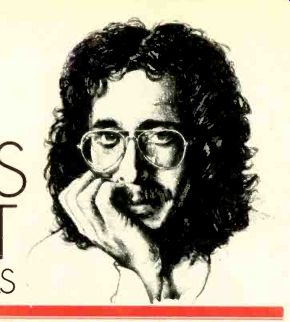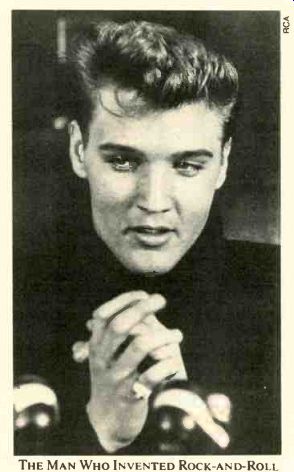
WINNERS IN A LOSER'S GAME
EVIS PRESLEY, despite middle age, umpteen god-awful films, Las Vegas, and his recent transmogrification from "The Pelvis" to "The Belly," is still the single most influential artist in the history of rock. Never mind that his last great single, Burning Love, was made three years ago, or that his last consistently good album, "Elvis Country," is even older--he remains the King. It is a well docu mented fact, for example, that the driving impulse behind the successes of the most important rock stars of the Sixties-Dylan and the Beatles-was a desire to be Bigger Than Elvis.
I bring all this up because I suspect that if you mention Elvis to the average kid-one whose rock-and-roll memory extends, if you're lucky, as far back as, oh, 1967 and "Sgt. Pepper"-you're going to get a polite snicker and a comment along the lines of "That cornball!" Frankly, given the percent age of junk Elvis has recorded over the years-soundtrack filler, San Remo ballads, a pathetically re-lyriced Plaisir d'Amour, even The Battle Hymn of the Republic-you could hardly expect that average kid to think other wise. For myself, I still have fantasies about Elvis fronting a tough young band, singing Mystery Train the way it should be sung, but I know it's never going to happen. Elvis is al ready such an institution that he doesn't have to do that or anything any more, and it doesn't matter whether that's because of Colonel Parker's business acumen or because of the already established vastness of Elvis' talent.
At any rate, at this very moment RCA's American branch is sitting on what is currently a gigantic seller for their British division, afraid or unwilling to release what is merely the best Elvis album in twenty years. It's called "The Sun Collection" (after Sun Records, the Memphis independent label that owned Presley's contract for sixteen months before his name became a household word), and it contains, simply, the bulk of the material Elvis recorded for that label, the records on which, for all intents and purposes, he invent ed rock-and-roll out of his nave adolescent fascination with rural blues, c-&-w, gospel, and traditional show-biz pop. Complete with an incredible cover, detailed information on the recording sessions, and truly comprehensive liner notes by Roy Carr of London's New Musical Express, it is, to date, the clearest picture extant of the development of one of American music's most influential figures.
It also saves you the trouble of hunting down the handful of American releases these tracks have heretofore been scattered over (Elvis has something like eight million LP's in the catalog, you see, and most stores stock only the million or so most recent ones). Your friendly neighborhood importer should be able to get "The Sun Collection" for you, but that's not enough; that average kid I mentioned should own one, if only to let him know Robert Plant didn't invent rock singing.

THE MAN WHO INVENTED ROCK-AND-ROLL
SEVERAL times in these pages I've commented on the problems confronting would-be interviewers of performing artists. It goes without saying that if you don't like an artist's work, communication is difficult, let alone cranking up enough enthusiasm even to attempt it. And if you're a fan, you're invariably disappointed by the disparity between the "real" person and the image of him or her you've nurtured over the years. Those are the obvious problems. But for me, at least, there are other reasons to dread interviews. One is that most rock musicians really have nothing interesting to say. (I can't imagine anything duller, for example, than trying to talk to the bass player for Uriah Heep.) Another (and you'll have to take this on faith if you aren't involved in this business professionally) is that publicists--the people who call you up and try to coerce you into participating in these rapes of the sensibilities--are among the most terrifyingly pertinacious people in the world. Doubtless they are perfectly harm less human beings at home with their loved ones, but believe me, in their hands Mr. Bell's seemingly benign little invention is a weapon only slightly less ruthless than a Sher man tank.
Anyway, even though I just don't like inter views, I let myself be cajoled recently into doing not one but two, and, to my surprise, both were highly enjoyable. The first was with Jon Bauman (better known by his stage name Bowzer) of Sha-Na-Na, who caught me off guard by appearing out of drag and looking for all the world like a graduate philosophy student. Over a corned-beef sandwich, he reminisced about his childhood in Brooklyn, mostly spent listening to early rock on such legendary AM stations as WMGM (home of Peter Tripp, "The Curly Headed Kid in the Third Row"), and diligently compiling lists of the top forty while his parents assumed he was practicing classical piano. And he admit ted that the chain-wielding hoodlum he plays on stage is, in fact, the kind of tough kid he never was but rather the kind who once made life a bit difficult for him. But my major journalistic coup was finding out what the band uses to plaster their hair into those Fifties duck-tails. They don't use that Greasy Kid Stuff. What they use is a lubricating gel well known to proctologists and anyone who has ever had any problems with irritation in that area wherein proctologists work. For the life of me, I can't see why the band has so far balked at endorsing it.
MY second sortie was with Tony Poole of Starry Eyed & Laughing, the English pub band whose first album I reviewed as an import a few months back. With no advance warning, their new album had just appeared here on American Columbia, and the band it self had also materialized for a few club gigs.
Both their live show (which I caught several times) and their new album impressed me tremendously (Eagles fans should get the record and discover how this kind of music is sup posed to sound), but I was impressed with the group as people as well.
Although we talked music a lot (Tony was particularly delighted at the chance to finally meet and in some cases play with the American musicians who had so influenced the band), what came through for me most strongly was a sense of the many perils that face a struggling rock act. Hassling with promoters who cut your set short, making barely enough money to cover your motel bills, dealing with audiences who are unfamiliar with your material and think of you (if they think of you at all) as merely "the opening act," working with a record label at best minimally supportive of your efforts-all of these things have to take a toll. But Starry Eyed & Laughing, aptly named, seem to be taking it all in their stride. Being young and dedicated to your music helps, I guess, but it is nice to know that at least one group still questions the truth of Ian Hunter's oft-quoted dictum to the effect that "rock-and-roll's a loser's game."
Also see:
Source: Stereo Review (USA magazine)